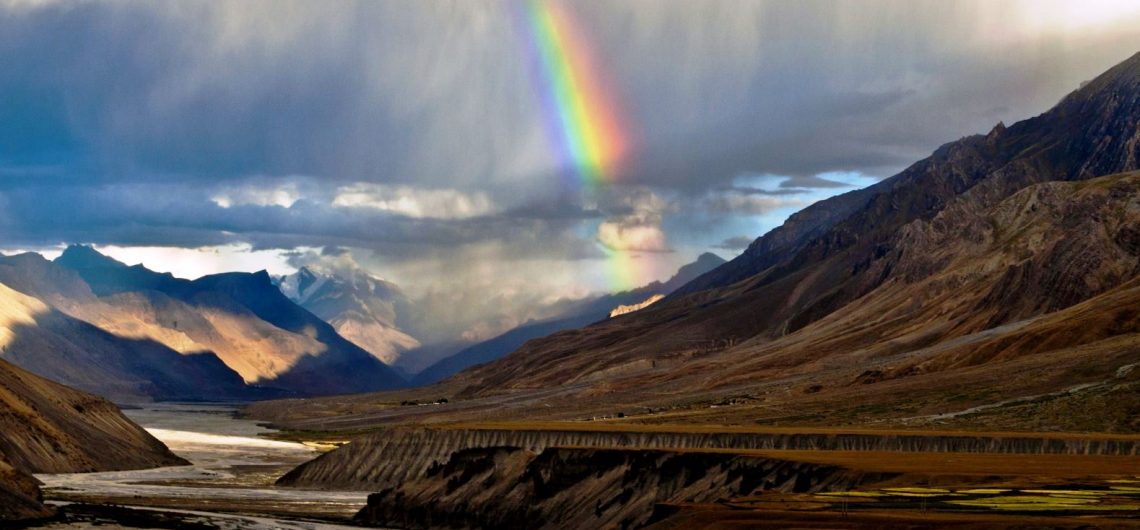Lovenish Kalra
Lovenish rarely uses any social media so if you wish to chat with him about travel, riding and music etc. then you may reach out to him at lovenish.kalra@adventurenation.com
Latest posts by Lovenish Kalra (see all)
- Hot Air Balloon: Floating Over the Pink City, Jaipur - September 11, 2020
- Treks to Make your September Happening - June 29, 2020
- Best Himalayan Treks in January - June 11, 2020
Spiti which literally translates to ‘The Middle Land’, is a cold desert located high in the Himalayas in the northern Indian state of Himachal Pradesh. The place derives its name from the geographical location in between the Indian peninsular mass and the Tibetan plateau. The barren and beautiful land is a part of the Lahul and Spiti district and is often cut off from the rest of the country for as long as six months a year due to heavy snowfall at the high altitude passes. The villages in the valley are some of the highest inhabited places on Earth and that’s why acclimatization becomes extremely important for travellers. The valley’s otherworldly landscape is characterized by barren mountains, treacherous passes, shimmering blue lakes and serpentine rivers.
Over the last decade, tourism has finally caught up in Spiti and travellers from all over the world visit the valley for its surreal moonscapes and the cultural experiences. Apart from seeing the stunning remote landscape, people also visit the place to indulge in some outdoor adventure activities such as motorcycling, trekking, white water rafting and camping etc. Being a relatively small land area, one should try to explore all parts of the valley but for someone who is a little short on time, below mentioned are the five places in the valley which are absolutely not to be missed.
Expolre: Spiti Valley Bike Trip and Popular Treks in Spiti Valley
Kaza
Located at an altitude of 3,650mt (11,960ft), Kaza operates as the sub divisional headquarters of the valley. Although, it is the biggest town in the valley but the population is a mere thirty two hundred. Located on the east bank of the Spiti River, the town is the central point for travellers entering the valley from both Shimla and Manali. It is surrounded by high mountain ridges on all sides and is one of the coldest towns in India. Known for its colourful festivals and the Buddhist architecture, the town is also home to the ancient Sakya Tangyud Monastery. Being in the centre of the valley, a few monasteries and remote villages including Hikkim and Komik can be accessed from the town. The tourist infrastructure is rather minimal including a tiny market, a few basic hotels and a couple of cafes. The primary mode of accommodation is the home stays run by the locals, providing basic amenities but offering absolute value for money.
Must Read: Travel to Spiti Valley to find Love, Peace and Harmony
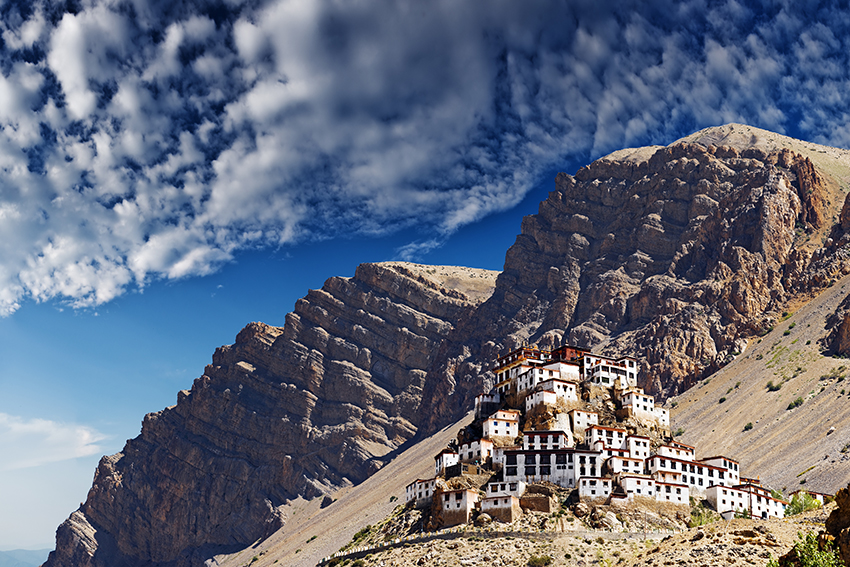
Kibber
Kibber, also known as Kyibar, is located 19km northwest of Kaza. Situated at an altitude of 4,270mt, it is one of the highest inhabited villages in India. The village lies in a narrow valley and all the houses are located on the summit of a limestone rock from where one gets interrupted mesmerising views of the lush green fields against the backdrop of naked mountains. Only six km to the south of the village, perched on a hill, is the popular Key Monastery. Offering staggering views of the Spiti River, the monastery is the largest in Spiti and serves as a religious centre for Lamas. The village is also home to The Kibber Sanctuary which spreads across 1400 sq. km and is a habitat for blue sheep and snow leopards. A lot of the high altitude treks in the valley also start from Kibber. Accommodation in the village is limited to the quaint home stays run by the villagers.
Must Read: My Fantastic Journey along the Hindustan Tibet Road
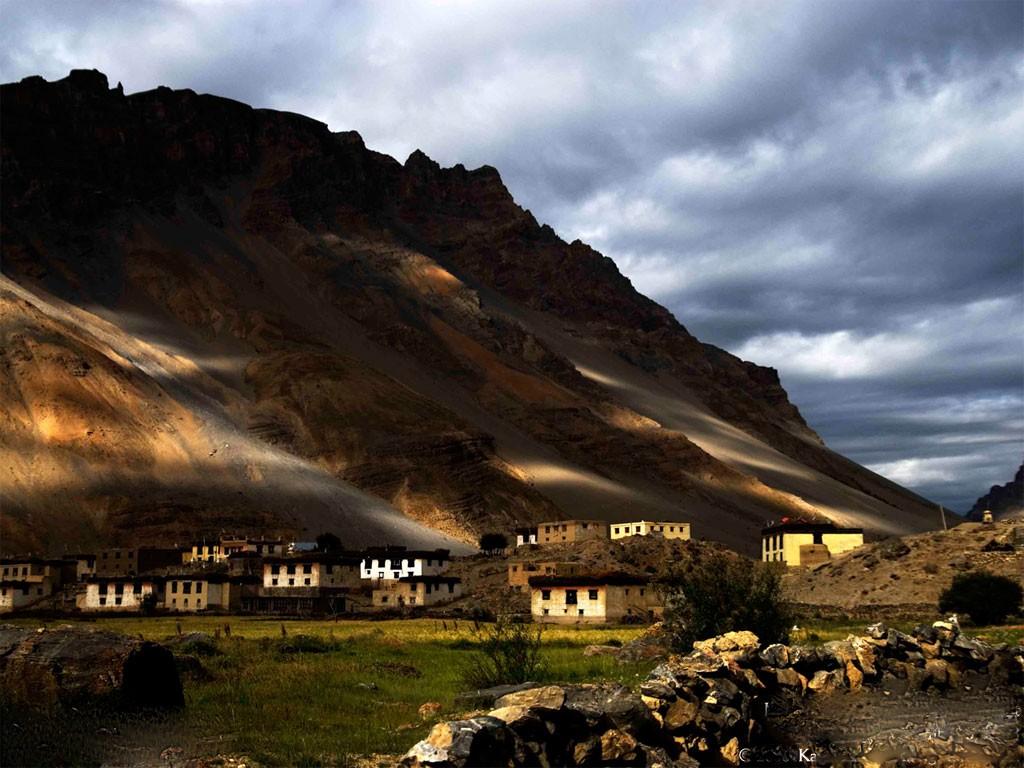
Pin Valley National Park
Located within the Cold Desert Biosphere Reserve in the valley, Pin Valley is one of the highest national parks in the world. The valley shelters over a dozen endangered species of wildlife animals and birds including the snow leopard, Ibex, Red fox, Bearded Vulture, Golden Eagle, Griffon and the Himalayan Chough Weasel. The national park, located near the Tibetan border, spreads south of the Dhankar Monastery between the towns of Kaza and Tabo. The altitude of the park ranges from around 3,500mt to 6,000mt which makes it an ideal destination for trekking. The most popular trek that operates in the valley is the Pin Parvati Pass Trek. Two significant trails go through the park, one gets you to the Kullu Valley and the other one enters Kinnaur through Bhaba Valley.
Must Read: Why Bhabha Pass Trek Should Be On Your Bucket List
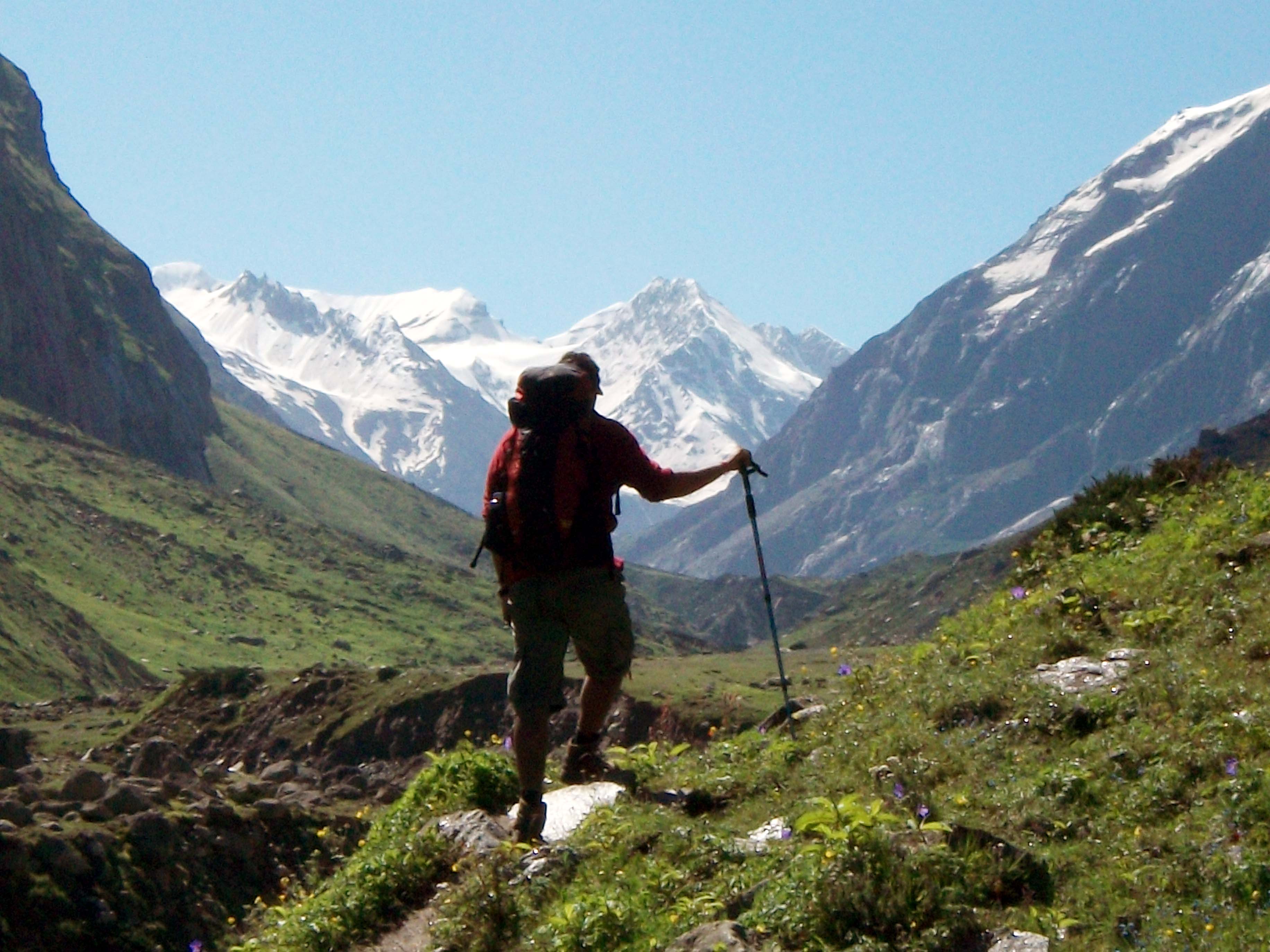
Langza
Although nestled between the mountains, Langza village is visible from many a mile because of the towering Buddha statue that’s present in the village. The mammoth golden statue is believed to be around 1000 years old and all the mud houses in the village are built below the statue for auspiciousness. Located at an altitude of 4,420mt, this is considered to be the highest motorable village in the world. The primary reason this village attracts a large no of travellers is the million years old fossils of marine creatures, that are found here under the sedimentary rocks. For serious trekkers, the village offers the gateway to two high altitude lakes known as Tsonyeti and Chumo Tso.
Must Read: Experience of a Lifetime at the Homestays in Spiti Valley
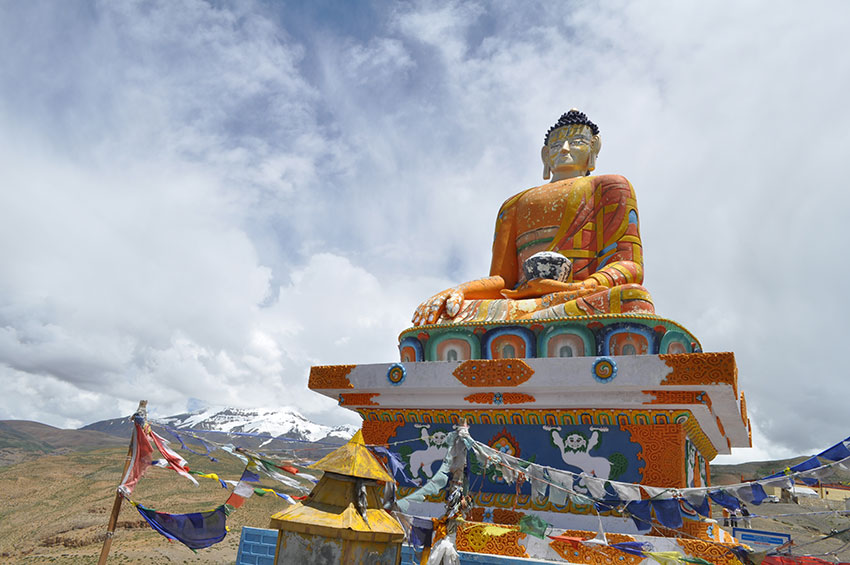
Chandratal Lake
Chandratal i.e. lake of the moon, derives its name from its crescent shape. The shimmering blue water lake, situated on the Samudra Tapu plateau overlooking the Chandra River, is situated at an altitude of 4,300mt. Over the last few years, the lake, located north of Kunzum Pass, has become a paramount tourist hotspot. One of the most significant reasons of its popularity is its proximity to the popular tourist town of Manali. Travelling by road via Kunzum Pass, it usually takes around six hours to reach the last motor able point near the lake. One also has an option of hiking to the lake from Kunzum, which takes around a couple hours and is an experience in itself. Camping near the lake has also become an enticing attraction amongst the tourists.
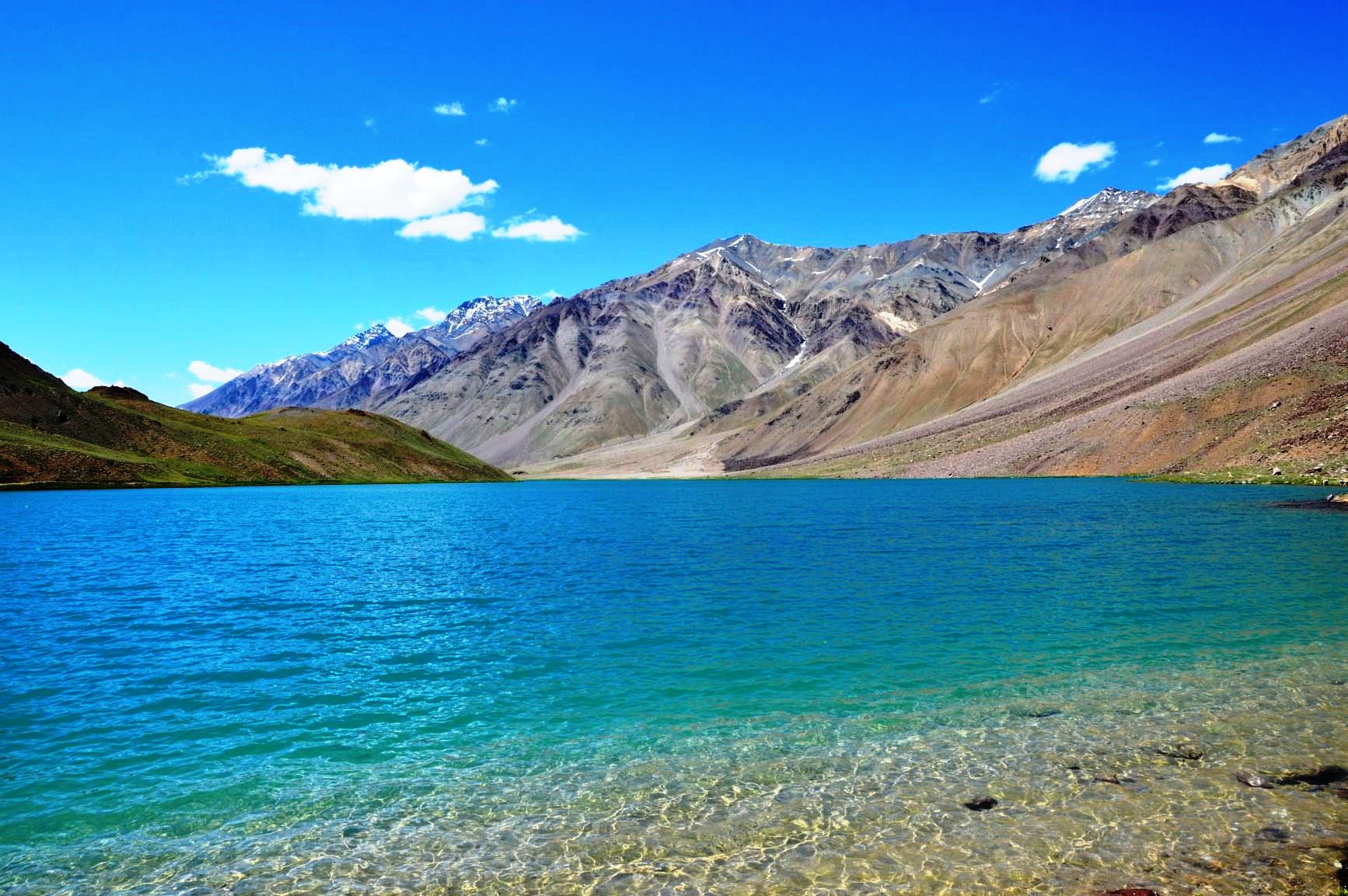
You can also explore Chandratal lake with Chandratal Lake Trek or Hampta Pass Trek with Chandratal Lake
Must Read: Chandratal – All You Need to Know

